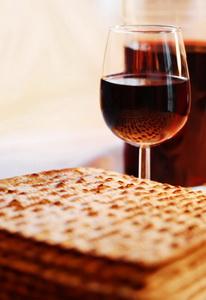
Ten years ago, kosher wine was considered the cough syrup of the wine world: mostly made from nasty Concord grapes and often sweeter than Buckley’s—but without as much nuance. Today, it’s no longer the wine of affliction: many kosher wines, made from classic grapes, are complex and full of character.
In fact, kosher wines sales are growing fast — up 12% since 2013. While no one tracks buyer demographics, some producers claim that up to half aren’t even members of the Jewish faith—they’re just attracted to the wine’s quality and its preparation, which guarantees purity. Kosher wines, like fashionable organic products, avoid pesticides and other chemicals.
Many Jewish holy-day traditions include wine, such as Rosh Hashanah in September and Passover in the spring. During Passover on April 15 this year, celebrants drink four cups of wine to symbolize the four dimensions of freedom. On the Sabbath, meals start with the kiddush, a sanctification of the wine. At the last meal, the wine is blessed in a ritual called havdalah.
“Kosher” comes from the Hebrew word for good, fitting or proper. The kashrut, the strict Jewish dietary code,  classifies food into three categories: naturally kosher foods, such as fruit and vegetables; foods not kosher by nature, but can be made so by processing under strict supervision; and foods that aren’t kosher and can never be, such as pork and shellfish.
classifies food into three categories: naturally kosher foods, such as fruit and vegetables; foods not kosher by nature, but can be made so by processing under strict supervision; and foods that aren’t kosher and can never be, such as pork and shellfish.
Packaged food and drink that are certified kosher usually bear a U symbol (for Union of Orthodox Jewish Congregations) or a K (for Organized Kashrut Laboratories).
The kosher process is exacting. It must be strictly supervised, usually by a rabbi, and none of the work can be done on a holy day. Only Jews who observe the Sabbath can handle the wine; and even after it’s  poured into barrels and given a rabbinical seal, a shomer (watchman) has to guard it.
poured into barrels and given a rabbinical seal, a shomer (watchman) has to guard it.
Kosher wine is essentially made the same way as other wine, except that no leavens, wheat or animal products can be used. The yeasts must be certified kosher; and though ordinary wines use gelatin or egg whites to filter suspended particles before bottling, kosher wines must use non-animal filters such as the agent bentonite or kosher fish gelatin.
There are actually two categories of kosher wine for consuming at religious ceremonies. The first must be handled and served only by Sabbath-observant Jews; but the second variety (called mevushal or boiled) can be handled by anyone and still maintain its integrity. That spiritual robustness is due to a process of flash-pasteurization: the t emperature of the wine is brought from 15°C to 90°C and back again, all in about ten seconds.
emperature of the wine is brought from 15°C to 90°C and back again, all in about ten seconds.
This is believed to strengthen the wine’s spiritual essence, and to make it impervious to any corrupting influences. It was also done to scare off heathens, so they wouldn’t use the wine in their own rituals. Unfortunately, it has also frightened away serious wine drinkers and given kosher wine a poor reputation.
If the heating process is done incorrectly, it can create an unwanted cooked character. However, with modern technology and correct technique, some winemakers believe it actually enhances the wine’s aromatics and stabilizes its tannins, fruit and colour.
Some of the world’s leading producers now also make kosher wine: classified Bordeaux châteaux Lafite-Rothschild, Giscours and La Gaffelière; Champagne’s Laurent-Perrier; and Beaujolais vintner Georges Duboeuf. From the New World, Hagafen Cellars in California and Rodrigues Markland Cottage Winery in Newfoundland. Yarden, Israel’s premium kosher wine, has won medals at Vinexpo, the annual wine Olympics held in France. For Passover, the LCBO will carry more than ninety kosher brands, and you’ll find my top kosher wine reviews here.
Many of these wines are worth drinking, whether or not you keep kosher. And be sure to raise a glass with the traditional Jewish toast” “L’chaim”—to life!








